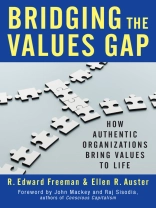Bridging the Values Gap
Business has a values problem. It’s not just spectacular public scandals like Enron (which, incidentally, had a great corporate values statement). Many companies fail to live up to the standards they set for themselves, alienating the public and leaving employees cynical and disengaged—resulting in lower productivity, less innovation, and sometimes outright corruption.
The reason, argue top scholars and consultants Edward Freeman and Ellen Auster, is that all too often values are handed down from on high, with little employee input, discussion, or connection to the challenges and opportunities facing the organization. Although the words may be well-intentioned, they aren’t reflected in the everyday practices, policies, and processes of the organization. This practically invites disconnects between intention and reality.
To bridge this gap between the “talk” and the “walk”, Freeman and Auster provide a process through which organizations can collectively surface deeply held values that truly resonate with everyone, from top to bottom. Their Values Through Conversation (VTC) process focuses on four key types of values conversations: introspective (reflecting on ourselves and how we do things in the organization), historical (exploring our understanding of our past and how it impacts us), connectedness (creating a strong community where we work well together), and aspirational (sharing our hopes and dreams).
By developing values through discussions—casual or formal, one-on-one or in groups—VTC ensures that values are dynamic and evolving, not static words on a wall or a website. Freeman and Auster offer advice, real-world examples, and sample questions to help you create values that are authentic and embraced because they are rooted in the lived experience of the organization.
Jadual kandungan
Foreword
Preface
Part I: Understanding the Values Gap in Business
Chapter 1: The Values Gap in Business
Chapter 2: Just Be Authentic: Not So Fast, Not So Easy
Chapter 3: Authentic Organizations: Is Yours One?
Chapter 4: Do Values Right or Don’t Do Them at All
Part II: How Businesses Can Bridge the Values Gap
Chapter 5: Introspective Values: Reflecting on Self and the Organization
Chapter 6: Historical Values: Exploring the Impact of Our Past
Chapter 7: Connectedness Values: Creating a Sense of Belonging and Community
Chapter 8: Aspirational Values: Our Hopes and Dreams
Part III: Bringing the Conversation to Life
Chapter 9: Getting Started
Notes
Index
About the Authors
Mengenai Pengarang
Ellen R. Auster is professor of strategic management and founding director of the Schulich Centre for Teaching Excellence at the Schulich School of Business, York University, Toronto, Canada. She is widely published and is the recipient of the prestigious Distinguished Educator Award conferred by the Academy of Management.












